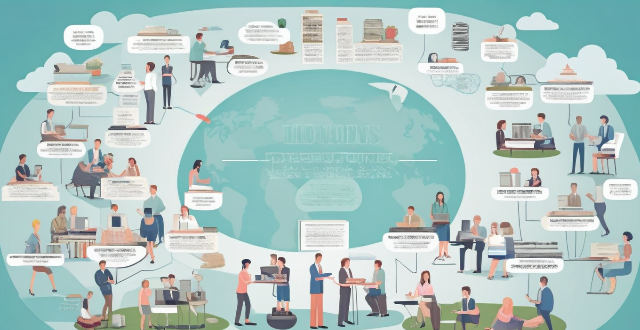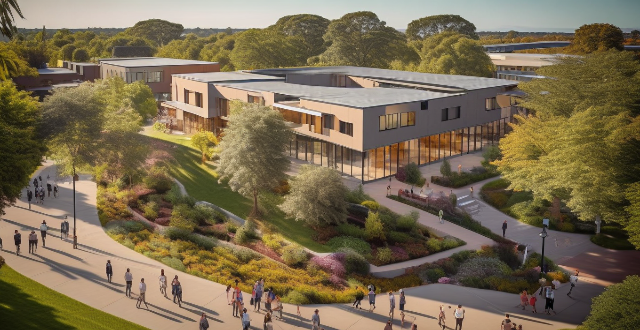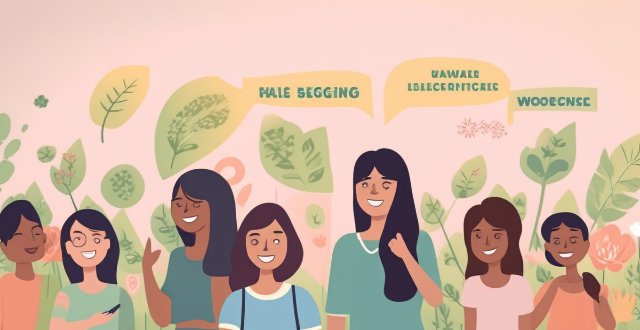Women Community

In what ways do women's empowerment initiatives contribute to community development ?
Women's empowerment initiatives are crucial for community development as they address gender inequalities and foster inclusivity. These initiatives benefit not only women but also have a positive ripple effect on the broader community, leading to more sustainable and equitable growth. Economic growth is achieved through increased participation in the workforce, entrepreneurship and innovation, and improved household economics. Social development is promoted through health and well-being, education, and gender equality. Political empowerment is enhanced through increased participation in decision-making and promotion of good governance. Environmental sustainability is ensured through resource management and climate action. Cultural preservation and exchange are enriched through artistic expression and cultural exchange. Women's empowerment initiatives are essential for comprehensive community development, addressing gender inequalities, promoting inclusivity, and paving the way for sustainable growth, social cohesion, and a brighter future for all members of the community.

How can women build a strong network in the business community ?
In today's competitive business landscape, building a strong network is crucial for success. For women, it is especially important to cultivate relationships with peers, mentors, and industry leaders. This guide will provide strategies and tips on how women can build a strong network in the business community by attending industry events and conferences, joining professional organizations, utilizing social media, seeking mentorship, and being proactive in maintaining relationships.

How can I get involved with women-focused charity work locally or internationally ?
Involving in women-focused charity work is a meaningful way to promote gender equality and empower women. This guide provides tips on how to get involved locally and internationally, including researching organizations, volunteering time, donating money or resources, attending events and fundraisers, fundraising for international organizations, participating in online campaigns, and traveling abroad to support women's issues. Additionally, it emphasizes the importance of being open-minded, building relationships, staying informed, and evaluating your impact to make the most of your participation.

What role do women play in addressing climate change ?
Women's Role in Addressing Climate Change: Women play a crucial role in addressing climate change through leadership and advocacy, innovative solutions, community engagement and education, and promoting gender equality and climate justice. They have led international negotiations, founded organizations dedicated to climate action, developed new technologies and business models, engaged in activities such as tree planting and waste reduction, and advocated for gender equality in decision-making processes. Women's contributions are essential to achieving a sustainable future for all.

How can immigrants effectively integrate into a new community ?
Effective integration of immigrants into a new community involves learning the local language, engaging with the community, embracing cultural differences, building a support network, seeking out resources, and being patient and persistent. These strategies can help immigrants communicate effectively, find employment opportunities, understand the culture, make friends, and navigate the legal processes involved in immigration.

What initiatives can be taken to improve scientific literacy among women ?
Scientific literacy is important for making informed decisions about health, environment, and technology. Women often face barriers to accessing scientific education and resources. To improve scientific literacy among women, initiatives such as educational programs, community outreach, media representation, and policy changes can be taken. These include integrating STEM subjects into the school curriculum, offering girls-only classes, connecting young girls with female role models in STEM fields, establishing community-based science clubs for women of all ages, organizing public lectures by women scientists, conducting workshops and training sessions on various scientific topics, highlighting stories of successful women in science through media platforms, encouraging more women to pursue careers in science journalism, utilizing social media platforms to create awareness about scientific issues affecting women's lives, advocating for increased funding for educational programs and research initiatives focused on improving women's participation in STEM fields, lobbying for policies that ensure equal opportunities for women in science education and employment, and implementing mandatory gender bias training for educators and professionals working in STEM fields. By implementing these initiatives, we can create a more inclusive environment that encourages women to explore and contribute to the field of science.

How does cultural sensitivity affect the implementation and success of women-oriented aid projects ?
Cultural sensitivity is crucial for the success of women-oriented aid projects, which involve understanding and respecting the cultural beliefs and practices of the target community. Implementation strategies include researching the cultural context, avoiding stereotypes, adapting to local customs, building trust with community leaders, collaborating with local women, designing culturally appropriate programs, providing training, monitoring progress, and adjusting strategies as needed. These steps help ensure that aid projects effectively meet the needs of local women and improve their lives.

In what ways does education empower women socially and politically ?
Education is crucial for women's empowerment, enabling them to challenge societal norms and contribute more fully to society. It fosters increased awareness, improved socioeconomic status, and enhanced social relationships. Education also leads to greater political participation, policy influence, and promotion of gender equality. Overall, education enriches society by improving the lives of women and contributing to a more equitable world.

What resources are available for women looking to start their own business ?
Starting a business can be challenging, but women can turn their entrepreneurial dreams into reality with the right resources and support. Government programs and grants, non-profit organizations and foundations, online platforms and networks, and educational resources are all available to help women start their own businesses. These resources provide funding opportunities, training programs, networking events, specialized programs for minority and immigrant women, counseling and mentorship opportunities, access to free resources and workshops, and more. By utilizing these resources, women can gain the knowledge, skills, and support needed to successfully start and grow their own businesses.

How can we use sports to promote gender equality and empower women and girls ?
Promoting gender equality and empowering women and girls through sports involves increasing visibility, ensuring fair representation, improving access and inclusivity, providing education and training, implementing policy and legislation, promoting health and wellness, encouraging economic empowerment, engaging the community, and fostering cultural change. These efforts aim to break down barriers, challenge stereotypes, and create opportunities for women and girls to thrive both on and off the field.

How can we empower women to lead the fight against climate change ?
Empowering women to lead the fight against climate change involves recognizing their unique perspectives, capabilities, and contributions to environmental conservation. This multifaceted approach includes: 1. **Recognizing Gender-Specific Impacts of Climate Change**: - Highlight the disproportionate impact on women through awareness and education campaigns. - Promote gender-sensitive climate policies that address specific needs and challenges faced by women. - Ensure gender-disaggregated data collection for a better understanding of climate impacts. - Support gender analysis in climate research to explore its effects on communities. 2. **Encouraging Women's Participation in Decision-Making**: - Increase representation of women who prioritize climate action in political involvement. - Foster women-led climate initiatives that are designed, implemented, and led by women. - Provide training programs that equip women with necessary skills for leadership roles. - Create networking opportunities for women to connect, share knowledge, and collaborate. 3. **Investing in Women-Centric Infrastructure and Technology**: - Train women in green technologies and renewable energy sectors for sustainable job opportunities. - Offer grants and loans to women entrepreneurs creating eco-friendly businesses. - Develop gender-responsive infrastructure projects like water systems and renewable energy setups. - Support women farmers through education on climate-resilient farming practices and access to resources. 4. **Amplifying Women's Voices in Climate Conversations**: - Ensure fair representation of women's voices in media coverage of climate issues. - Leverage digital platforms to amplify women's messages and campaigns related to climate change. - Support women-led grassroots movements focusing on local environmental issues. - Organize educational workshops in communities, led by women offering unique perspectives. By adopting these strategies, we can empower women, strengthen the fight against climate change with innovative solutions, and foster inclusive leadership.

What steps can women take to build a strong professional network ?
Building a strong professional network is crucial for career growth and advancement. For women, it can be especially important as they often face unique challenges in the workplace. Here are some steps that women can take to build a robust professional network: 1. Attend industry events and conferences. 2. Join professional organizations and associations. 3. Utilize social media and online platforms. 4. Find a mentor or sponsor. 5. Participate in training programs and workshops. 6. Volunteer for committees or boards. 7. Stay in touch with colleagues and alumni.

How does climate change disproportionately affect women in developing countries ?
Climate change disproportionately affects women in developing countries due to socio-economic factors, cultural norms, and division of labor. Impacts include reproductive health issues, nutritional deficiencies, loss of traditional occupations, increased workload, water scarcity, and energy poverty. Adaptation and mitigation efforts should involve women in decision-making and build their capacities. Gender-sensitive policies and interventions are needed to address these challenges and promote a more equitable future.

How can we encourage more women to pursue leadership roles ?
Encouraging Women to Pursue Leadership Roles - **Education and Awareness**: Promote STEM education, highlight role models, address gender stereotypes. - **Workplace Policies and Practices**: Establish flexible work arrangements, provide mentorship programs, enforce anti-discrimination laws. - **Networking and Professional Development**: Sponsor women's networking events, offer leadership training programs, create women-specific scholarships. - **Cultural Change and Empowerment**: Promote a culture of inclusivity, address the confidence gap, celebrate women's achievements.

How can women leverage social media to promote their businesses ?
Social media offers a powerful platform for women entrepreneurs to promote their businesses. To effectively leverage it, they should define their brand story, choose the right platforms, build a strong presence, engage with their audience, collaborate with other women entrepreneurs, utilize influencer marketing, and monitor performance through analytics. By following these strategies, women can harness the power of social media to elevate their businesses, connect with customers, and achieve their entrepreneurial dreams.

What are the best coping strategies for women experiencing empty nest syndrome ?
Empty nest syndrome can be challenging for women, butEmpty nest syndrome can be challenging for women, butcknowledging feelings, but coping strategies like acknowledging feelings, rediscovering oneself, building routines, staying connected with children, and seeking professional help can help navigate this phase of life.

Can women serve on juries and hold positions of power within the legal system ?
The role of women in the legal system has evolved significantly over time. Women are now allowed and encouraged to serve on juries, bringing diversity of perspectives, increased trustworthiness, and improved decision-making. However, women still face challenges in achieving parity with men in holding positions of power within the legal system. Efforts such as affirmative action programs, mentorship programs, and flexible work arrangements have been implemented to address these issues.

How can we involve community members in climate adaptation planning ?
Community engagement is crucial for successful climate adaptation planning. To involve community members, identify and engage stakeholders, develop a stakeholder engagement plan, use multiple channels of communication, involve community members in decision making, provide training and education, foster partnerships and collaboration, and monitor and evaluate progress. By doing so, you can create a more resilient community that is better prepared for the impacts of climate change.

How can women effectively manage their wealth ?
Managing wealth is crucial for women to achieve financial security. Tips include setting SMART financial goals, creating a budget, building an emergency fund, investing wisely, prioritizing retirement savings, and seeking professional advice. By following these steps, women can effectively manage their wealth and achieve their financial goals.

What are the common fertility issues faced by women ?
Fertility issues can be a sensitive and complex topic for many women. There are several common fertility problems that women may face, which can impact their ability to conceive and carry a pregnancy to term. These include ovulation disorders, endometriosis, uterine fibroids, tubal blockage, and age-related infertility. It's important for women who are struggling with fertility to seek medical advice and explore treatment options that best suit their individual needs and circumstances.

Why is it important to address violence against women as a human rights issue ?
Violence against women is a widespread problem that violates basic human rights and has far-reaching consequences for individuals, families, communities, and society at large. Addressing violence against women as a human rights issue is essential for upholding these basic rights, promoting gender equality, breaking the cycle of poverty and marginalization, and fulfilling our legal obligations under international law. By raising awareness about this issue and working towards creating a world where all individuals can live free from fear and violence, we can help create a more equitable and just society for all.

How can women protect themselves from gender-based discrimination and harassment ?
Gender-based discrimination and harassment are pervasive issues that women face in various settings, including the workplace, education, and public spaces. To protect themselves, women can take several proactive steps to ensure their safety and well-being, including educating themselves about their rights and forms of harassment, creating a supportive network, taking preventive measures, reporting incidents promptly, seeking legal advice and counseling services when needed, and advocating for change by raising awareness and participating in policy making. By employing these strategies, women can better protect themselves from gender-based discrimination and harassment while also contributing to a broader cultural shift towards equality and respect.

What are some successful women-led philanthropic projects that have made a significant impact in their communities ?
The article discusses several successful women-led philanthropic projects that have made significant impacts in their respective fields. These include The Malala Fund, which aims to empower girls' education globally; The Empowerment Center for Women in Saudi Arabia, which provides skills training and job opportunities for women; The Global Fund for Women, which supports grassroots women's groups worldwide; The Akilah Institute, which offers quality education and leadership training to young women in Zimbabwe; and The Women's Refugee Commission, which advocates for the protection of refugee women and children.

How can we measure the effectiveness of community climate adaptation efforts ?
Measuring the effectiveness of community climate adaptation efforts is crucial for understanding their impact on resilience to climate change. Key steps include setting clear objectives, developing relevant indicators, collecting and analyzing data, transparent reporting, evaluating success, iterative improvement, community engagement, and policy alignment. By following these steps, communities can ensure their adaptation efforts are effective and continuously improved.

How does scientific literacy among women affect their decision-making abilities in healthcare and environmental issues ?
The level of scientific literacy among women significantly influences their decision-making abilities in healthcare and environmental issues. Scientifically literate women are better equipped to access, understand, and critically evaluate health information, leading to healthier lifestyle choices and more effective communication with healthcare providers. They also show greater awareness of environmental issues and are more likely to adopt sustainable practices, engage in conservation efforts, and advocate for evidence-based policies. Enhancing scientific literacy among women is crucial for empowering them to make well-informed choices that benefit both their own health and the environment.

What role do community gardens play in city greening efforts ?
Community gardens play a significant role in city greening efforts by providing environmental, social, economic, and urban planning benefits. These gardens improve air quality, enhance biodiversity, and promote soil health. They also foster community building, offer educational opportunities, and contribute to health promotion. Economically, community gardens provide food security and create job opportunities. Integrated into urban planning, they beautify cities and promote sustainable development. Overall, community gardens are vital for ecological health and improving residents' quality of life.

How do climate change impacts differ for men and women in urban vs. rural areas ?
Climate change impacts vary by gender and geography, with urban and rural areas presenting distinct challenges for men and women. Urban men benefit from more job opportunities and adaptation resources, while urban women face vulnerabilities during extreme events, health concerns, and economic disruption. Rural men are often dependent on natural resources for livelihoods and may migrate due to climate change, whereas rural women bear agricultural responsibilities, caregiving roles, and water collection tasks, all of which are affected by climate stressors. Key differences include resource access, infrastructure, livelihood dependencies, and gender roles, with women often bearing a disproportionate burden. Addressing climate change requires recognizing these differences and developing targeted strategies for the most vulnerable populations.

How do sports events promote social interaction and community building ?
Sports events play a significant role in promoting social interaction and community building. They bring people together, foster a sense of belonging, and create opportunities for individuals to connect with one another. This is achieved through encouraging participation, building community spirit, providing entertainment and recreation, facilitating networking opportunities, and enhancing diversity and inclusion. By bringing people together around a shared passion for sports, these events create lasting connections and positive experiences that extend far beyond the playing field.

How can women build a diversified portfolio to minimize risks and maximize returns ?
The article provides a comprehensive guide on how women can build a diversified portfolio to minimize risks and maximize returns in the stock market. It emphasizes the importance of education, starting early, setting clear goals, diversifying investments across different asset classes, industries, and geographic regions, rebalancing regularly, and considering professional advice when needed. By following these tips, women can create a strong foundation for long-term financial success.

How do sports initiatives support community health and wellbeing in cities ?
Sports initiatives in cities are crucial for promoting physical activity, social interaction, mental health, and overall quality of life. The collaboration between the International Olympic Committee and PATH is a prime example of how these initiatives can make a significant impact on community health. By increasing access to health-enhancing community sport activities, sports initiatives support physical activity, enhance social interaction, improve mental health, raise awareness about health issues, and contribute to economic impact and urban development. These initiatives are valuable investments for city planners and policymakers as they promote community health and wellbeing in urban areas.